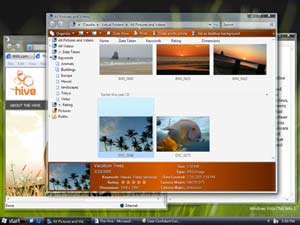 An unpleasant surprise awaits over 2 million users testing Windows Vista.
An unpleasant surprise awaits over 2 million users testing Windows Vista.
These volunteers will assist Microsoft in testing and evaluating Vista Beta 2, a nearly complete version of the latest Windows operating system. This will also be the final trial of Vista before Microsoft officially launches the user version in January next year.
Clumsy Design
However, according to USA Today, these 2 million individuals will face an annoying security feature known as User Account Control (UAC).
Designed to prevent intruders from executing destructive commands within the system, this feature automatically blanks the computer screen and forces you to confirm that you “really” want to perform a certain function.
In previous beta versions, UAC frequently triggered pop-up windows, even when users were executing very ordinary commands like changing the clock or deleting a shortcut. Sometimes these windows appeared so often that the only way to close them all was to restart the computer, said Paul Thurrott, editor of Windows IT Pro magazine.
“Microsoft has completely ruined UAC. This is what you call clumsy + enthusiasm, which is almost destructive,” Thurrott remarked.
For its part, Microsoft indicated that it will continue to improve and refine the product before releasing the final version. “The final product will operate smoothly and ensure security,” said Alex Heaton, the Windows product manager.
Vista has gone through several delays in its release, the most recent being a shift from before the Christmas season of 2006 to early 2007.
Considered a crucial turning point following Windows XP, Vista carries Microsoft’s hopes of dominating both home and office environments. However, Microsoft has struggled with tightening security for Vista, partly because it wants legacy software applications to run on Vista as well.
Searching for Reasons
The Windows operating system turns users into “system administrators” with full privileges to change and adjust the system’s core configurations. Most Windows applications are designed to take advantage of this openness. The problem is that this openness also provides opportunities for hackers to easily implant malware into Windows.
Microsoft should have asked software developers to adjust the access mechanisms for system administration functions, but it chose a different path. The result is the annoying pop-up windows of UAC. “Historically, Windows has always been open. When it tries to tie users’ hands, it immediately drives them crazy,” said Andrew Jaquith, an analyst at Yankee Group.
Security experts are concerned that Vista users will ignore these UAC windows, quickly clicking through them or even finding ways to disable them altogether. This is all because Microsoft has built the system so clumsily and caused various inconveniences. “They are pushing users to (have to) turn their backs on protective measures,” Thurrott commented.
Destiny


















































